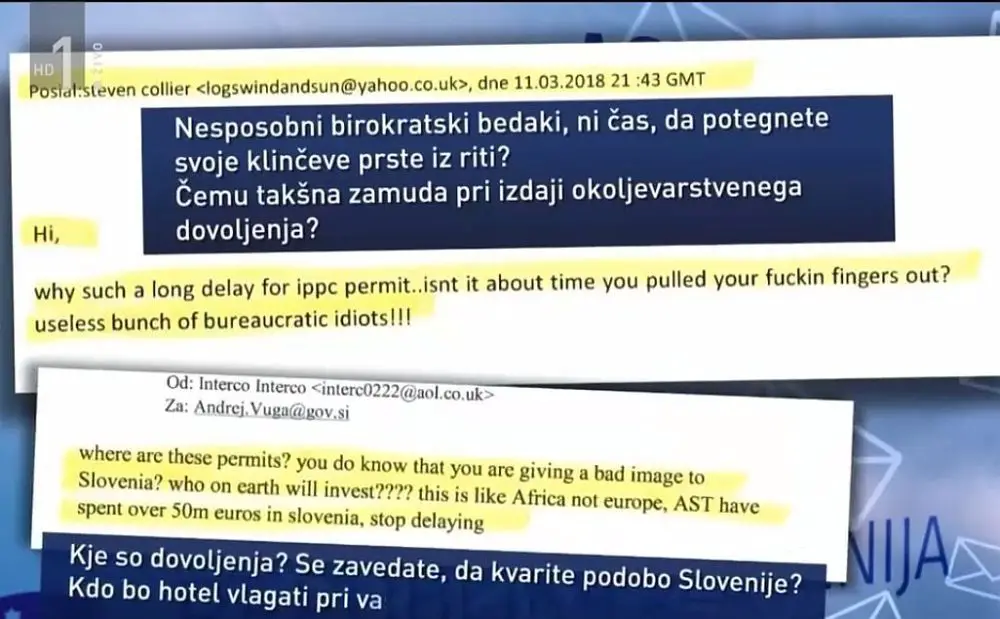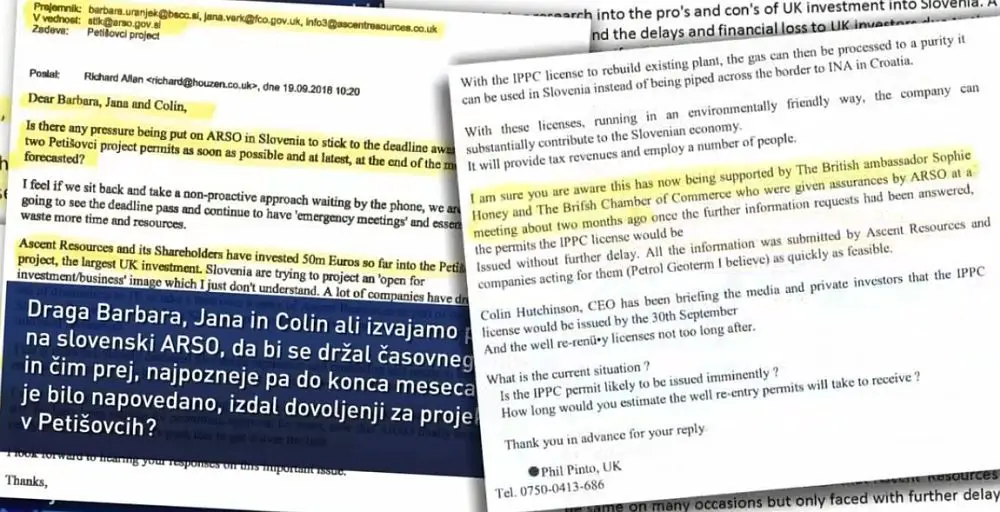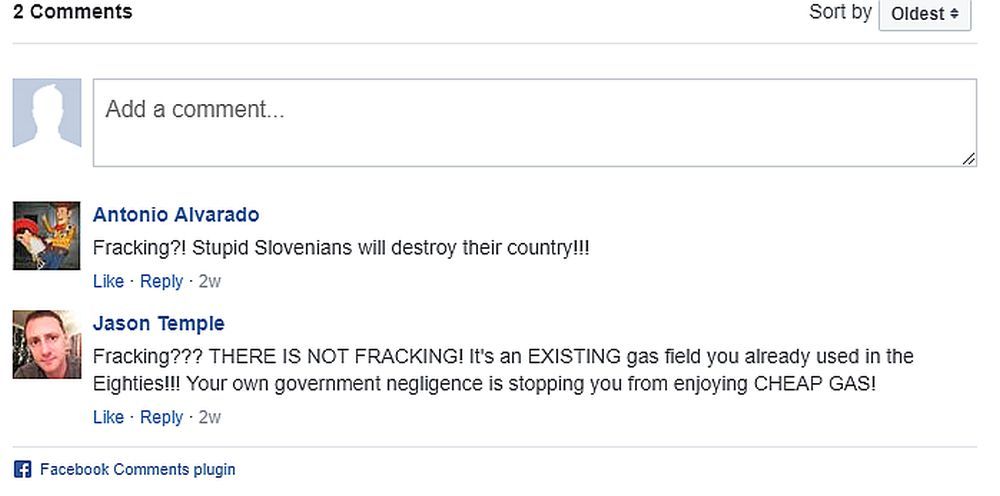December 8, 2018
The drama over Petišovci gas extraction permits and the British company Ascent Resources appears to be one of those classic tales of a conflict between one country’s sovereign right over its environmental protection standards and the profit-making interests of the international capital, backed by neoclassical economics’ arguments on the beneficial effects of any foreign direct investment on the local economies.
However, this textbook ideological conflict was given another spin by an army of internet trolls, who sent a series of harassing messages to Slovenian government officials, including the Minister of Environment, which resulted in strengthening the Minister’s police protection and an internal investigation into the procedures surrounding the issue of environmental permits by the Ministry’s environmental agency (ARSO). With the British Ambassador also involved in lobbying for the British firm, three Slovenian political parties have also demanded that her involvement be investigated.
The issue centres on fracking in Slovenia
Gas has been extracted at Petišovci, North East Slovenia, since the 1960s, first by state-owned enterprises, then in 2002 the concession was granted to Geoenergo d.o.o. whose equal shareholders are two state-owned firms, Petrol and Nafta Lendava. Initially, gas was being extracted under its own pressure, until, according to Gorazd Marinček, eco activist, the problematic method of hydraulic fracturing, or “fracking”, was introduced in two wells around the year 2011.
At least since 2011, Geoenergo has been in a 25/75 Joint Venture Agreement with the Maltese firm Ascent Slovenia Limited, a subsidiary of a London based company Ascent Resources (established in 2004). Another subsidiary of Ascent Resources, Ascent Resources d.o.o. is also located at the same address in Lendava. According to a recent edition of RTV Slovenia’s Tarča (Target) the only income of the Ascent Resources comes from unrefined gas extraction from the two remaining operating wells in Petišovci. The chain of companies, according to Tarča, reported a loss of over EUR 2.5 million last year, while awaiting the ARSO environmental permit that would allow it to deepen the wells and boost production, as well as to “build a processing plant to treat the gas for injection into the Slovenian national gas network achieving the highest possible price” (source).
The joint venture applied for and also received the environmental permits in 2014. However, environmental NGO’s appealed to the Ministry of Environment, although their appeal was rejected, so they moved further to the administrative court, which confirmed procedural inconsistencies in the permit issuing process and returned the matter back to the starting point at ARSO. The process was repeated again with an appealed to the Ministry, then the administrative court, which rejected the appeal, so that the process in this second round has not yet been cancelled.
Pressure from British investors, and irregularities in the permit process
Meanwhile, the British side of the venture has been growing increasingly impatient. On February 15 2018, the CEO of the Ascent Resources, Colin Hutchinson, visited then Slovenian Prime Minister Miro Cerar, and on July 4th representatives of the company met with the Economic Minster. However, in August, when the old government was leaving and new one hadn’t taken over yet, a meeting was arranged at the initiative of the British-Slovenian Chamber of Commerce. The invitations to all parties were dispatched by the Ministry's directorate, and, most problematically, the meeting was eventually attended by Nataša Petrovič, the director of the Environment and Nature Protection Office in charge of ARSO’s environmental permits.
Apparently, at this meeting, which, according to the Ministry was only of informative nature, promises were made to the Ascent Resources (AR) that the environmental permit would be ready before the end of September, which is what AR then announced to investors. At the end of October, however, the new Environmental Minister, Jure Leben, introduced an internal investigation into the possibility of any external pressures being exercised over the ministry’s officials in the process of issuing environmental permits. The investigation eventually confirmed irregularities in these procedures, which included the August meeting of Nataša Petrovič with the AR representatives. As Tarča reported: “the Office director has participated in the meeting and provided information on specific procedures, thereby raising doubts as to the autonomy and independence of the Office, and allowing public interpretations, harmful for the reputation of the Office and its officials.” Furthermore, no minutes of this August meeting exist nor has the lobbying contact been reported to the Corruption Prevention Commission.
Threats of legal action accompanied by hate mail
Also at the end of October, AR announced it would explore taking Slovenia to the EU Court after the company failed in its attempts to get a response from the Environment Agency on Jure Leben’s internal inquiry into the awarding of environmental permits.
Furthermore, the number of offensive messages sent to ARSO, presumably by enraged British shareholders, multiplied and also hit Minister Leben’s mailbox and Twitter account. The minister is currently under enhanced police protection while a criminal investigation into the source of messages is taking place.



Insulting comments by what appear to be fake Facebook accounts even managed to find their way to our own website, trying to stir the fight under an article on the matter. Luckily, nobody took the bait.

Let’s not forget that in America in 2016 “Russian actors organized both anti-Islam and pro-Islam protests in the same location at the same time on May 21, 2016, using separate Facebook pages operated from a so-called troll farm in St. Petersburg”. The whole mission costed about US $200. (Source)
The British Embassy connection
To complicate the situation a bit further, on November 13 the British Ambassador to Slovenia, Sophie Honey, paid a visit to the Environmental Minister Jure Leben, asking questions about the possible deadlines for environmental permits and also about the results of the internal investigation. HMA Honey appears to have been advocating for the Petišovci project at least since January 2017, when she visited the site of the project and met with the Slovenian and British partners.
At about the same time three extra-parliamentary parties, Solidarity, Pirates and the United Left, asked for an ethical assessment of the British Ambassador’s conduct, who they believed lobbied the previous government to accelerate the license award process.
As reported by Delo, the British Embassy in Ljubljana denied the allegations, and explained that HMA Sophie Honey did not in any way want to influence the Slovenian decision, but only highlighted the need for predictable deadlines in procedures for foreign investors, including for AR, with this being an important part of achieving the goals of increasing bilateral trade and investment between the states.
Furthermore the tree political parties stated that they saw AR’s attempt to take Slovenia to the EU Court, to overrule the Slovenian system, as a kind of threat, even if no other pressures were being applied.
Let’s not forget that the confidence of Slovenia’s environmental administration in dealing with pressures from foreign capital rose significantly just last month, when the French multinational Lafarge sued Slovenia over being denied a renewed environmental permit after years of burning banned petroleum coke in its cement plant in Trbovlje. Lafarge finally lost its case at the Slovenian Administrative court, and is currently shutting down its operations in Slovenia.






